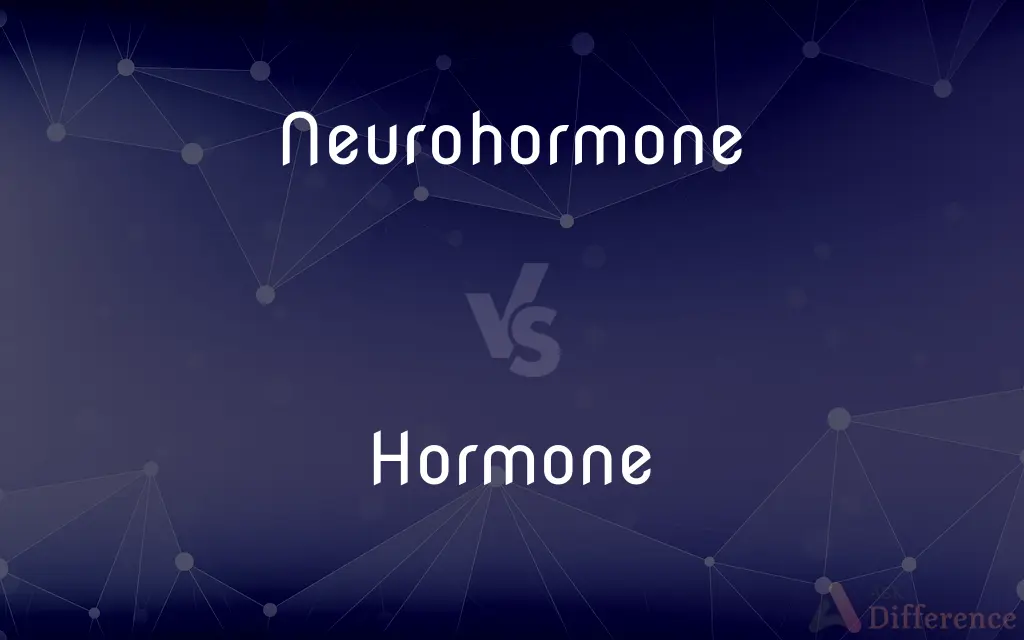Neurohormone vs. Hormone — What's the Difference?
By Urooj Arif & Fiza Rafique — Updated on April 20, 2024
Neurohormones are hormones released by neurons into the influencing distant cells, while hormones are broader substances secreted by glands affecting various bodily functions.

Difference Between Neurohormone and Hormone
Table of Contents
ADVERTISEMENT
Key Differences
Neurohormones are chemical messengers synthesized by neurosecretory cells in the brain, such as the hypothalamus, whereas hormones can be produced by various endocrine glands throughout the body.
Neurohormones typically perform specific regulatory functions in the nervous system, like oxytocin influencing social behaviors and bonding; on the other hand, hormones like insulin regulate wide-ranging physiological processes such as glucose metabolism.
The secretion of neurohormones is often a response to neurological stimuli and is directly released into the body, while hormones are generally released in response to biochemical signals and may involve complex feedback systems.
Neurohormones often have targeted, precise effects on particular brain functions or behaviors, whereas hormones can have broad systemic effects, impacting multiple tissues and organ systems.
Comparison Chart
Source of Production
Neurons, particularly in the brain
Various glands throughout the body
ADVERTISEMENT
Types of Functions
Regulate brain functions, behavior
Regulate metabolic, reproductive, other processes
Examples
Oxytocin, vasopressin
Insulin, cortisol
Release Trigger
Neurological stimuli
Biochemical signals, other hormones
Target Impact
Often targeted at brain regions or specific functions
Broad, systemic effects on multiple organs
Compare with Definitions
Neurohormone
Substances that mainly affect brain functions and behaviors.
Vasopressin, a neurohormone, helps control water balance.
Hormone
Often works through complex feedback mechanisms.
Insulin secretion increases in response to high glucose levels.
Neurohormone
Acts primarily on specific target cells.
Dopamine, a neurohormone, acts on parts of the brain to influence mood and reward.
Hormone
Involved in regulating a wide range of bodily functions.
Estrogen plays a key role in reproductive health.
Neurohormone
Released directly by neurons in response to stimuli.
The release of neurohormone melatonin is triggered by changes in light.
Hormone
A chemical messenger secreted by glands.
Thyroid hormones regulate metabolism and energy levels.
Neurohormone
Involves in regulating physiological and psychological processes.
Melatonin regulates sleep-wake cycles.
Hormone
Can target multiple organs or tissues.
Adrenaline affects the heart, muscles, and airways during stress.
Neurohormone
A hormone secreted by or acting on a part of the nervous system.
Hormone
Has broad systemic effects.
Cortisol affects immune response, metabolism, and stress responses.
Neurohormone
Any hormone that stimulates the nervous system.
Hormone
A hormone (from the Greek participle ὁρμῶν, "setting in motion") is any member of a class of signaling molecules in multicellular organisms, that are transported to distant organs to regulate physiology and behavior. Hormones are required for the correct development of animals, plants and fungi.
Neurohormone
A hormone that is released by nerve impulses (e.g., norepinephrine or vasopressin)
Hormone
A synthetic compound that acts like a hormone in the body.
Hormone
Any of various similar substances found in plants and insects that regulate development.
Hormone
(pharmacology) A synthetic compound with the same activity.
Hormone
(botany) Any similar substance in plants.
Hormone
To treat with hormones.
Hormone
A chemical substance formed in one organ and carried in the circulation to another organ on which it exerts a specific effect on cells at a distance from the producing cells; thus, pituitary hormones produced in the brain may have effects on cells in distant parts of the body..
Hormone
A chemical substance, whether natural or synthetic, that functions like a hormone in a living organism. Thus, synthetic steroid hormones may be more effective than their natural counterparts.
Hormone
A substance that controls growth rate or differentiation in plants; also called phytohormone. The most well-known are the auxins that stimulate growth at the growing tips of plants, and control root formation and the dropping of leaves; and the gibberellins, which are used in agriculture to promote plant growth.
Common Curiosities
What are some common hormones and their functions?
Common hormones include insulin (regulates sugar), cortisol (manages stress), and thyroid hormones (controls metabolism).
Can neurohormones influence emotional states?
Yes, neurohormones like oxytocin and serotonin significantly influence emotions and social behaviors.
How are hormones regulated in the body?
Hormones are regulated through feedback mechanisms that maintain homeostasis by increasing or decreasing hormone levels based on the body's needs.
How do neurohormones differ from regular hormones?
Neurohormones are produced by neurons and often target brain activities, while hormones are generally secreted by endocrine glands and have broader systemic effects.
What is a neurohormone?
A neurohormone is a type of hormone released from neuron cells, specifically impacting brain functions and systemic processes.
What role does the hypothalamus play in hormone production?
The hypothalamus produces several neurohormones that regulate functions from hunger to temperature control and link the nervous system to the endocrine system via the pituitary gland.
Can a substance be both a hormone and a neurohormone?
Yes, substances like adrenaline can function both as hormones and neurohormones depending on their site of release and action.
How do neurohormones impact physical health?
Neurohormones can affect physical health by regulating essential functions like water balance, and reproductive activities.
What is the difference in the release mechanism between hormones and neurohormones?
Neurohormones are directly released into the body by neural stimuli, while hormones are typically released following biochemical signals.
Are neurohormones involved in disease states?
Yes, imbalances in neurohormones can contribute to conditions like depression, diabetes insipidus, and sleep disorders.
Share Your Discovery

Previous Comparison
Dubious vs. Doubtful
Next Comparison
Bimbo vs. GoonAuthor Spotlight
Written by
Urooj ArifUrooj is a skilled content writer at Ask Difference, known for her exceptional ability to simplify complex topics into engaging and informative content. With a passion for research and a flair for clear, concise writing, she consistently delivers articles that resonate with our diverse audience.
Co-written by
Fiza RafiqueFiza Rafique is a skilled content writer at AskDifference.com, where she meticulously refines and enhances written pieces. Drawing from her vast editorial expertise, Fiza ensures clarity, accuracy, and precision in every article. Passionate about language, she continually seeks to elevate the quality of content for readers worldwide.














































